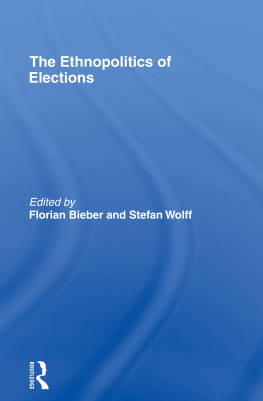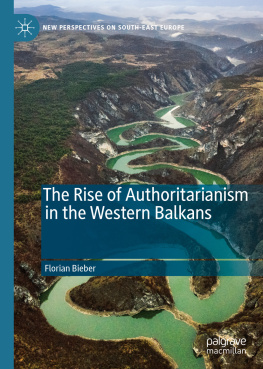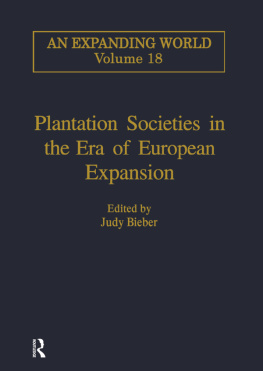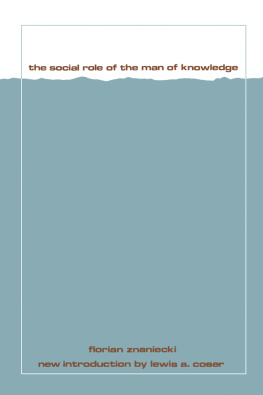The Ethnopolitics of Elections
Free and fair elections are one of the most fundamental characteristics of democratic systems. In ethnically plural societies, elections take on extra significance as the rules and regulations on which they are based provide important levers to guarantee or prevent adequate representation of different communal groups within the key institutions of the state. As a consequence, elections and electoral systems are contested vigorously.
The Ethnopolitics of Elections examines the ethnopolitical dimensions of electoral system design, election campaigns, and results. It conceptualises the dynamics underlying electoral politics in ethnically divided societies, and provides empirical evidence and in-depth analysis of recent elections within such societies on a comparative and single-case basis, including
- Macedonia
- Slovakia
- Belgium
- Malaysia
- Singapore
- Rwanda
- Guyana
- Trinidad & Tobago
Florian Bieber is Lecturer in East European Politics at the University of Kent, United Kingdom. He is also Senior Non-Resident Research Associate with the European Centre for Minority Issues.
Stefan Wolffis Professor of Political Science at the University of Nottingham in England, United Kingdom. He is founding editor of the journal Ethnopolitics (Routledge), co-chair of the Specialist Group on Ethnopolitics of the Political Studies Association of the UK, and a member of the advisory board of the Minorities at Risk project.
The Ethnopolitics of Elections
Florian Bieber & Stefan Wolff
First published 2007
by Routledge
2 Park Square, Milton Park, Abingdon, Oxon, OX14 4RN
Routledge is an imprint of the Taylor & Francis Group
Transferred to Digital Printing 2009
2007 Florian Bieber & Stefan Wolff
Typeset in Times by Techset Composition Limited
All rights reserved. No part of this book may be reprinted or reproduced or utilised in any form or by any electronic, mechanical, or other means, now known or hereafter invented, including photocopying and recording, or in any information storage or retrieval system, without permission in writing from the publishers.
British Library Cataloguing in Publication Data
A catalogue record for this book is available from the British Library
ISBN 10: 0-415-40047-3 (Hbk)
ISBN 10: 0-415-49502-4 (Pbk)
ISBN 13: 978-0-415-40047-3 (Hbk)
ISBN 13: 978-0-415-49502-8 (Pbk)
The Ethnopolitics of Elections
Contents
| Florian Bieber & Stefan Wolff |
| Renske Doorenspleet |
| Eben Friedman |
| Jean-Benoit Pilet |
| Eugene K. B. Tan |
| Graham K. Brown |
| David Emmanuel Kiwuwa |
| Sara Abraham |
FLORIAN BIEBER* & STEFAN WOLFF**
*European Centre for Minority Issues, Flensburg, Germany; **Department of European Studies, University of Bath, UK
Divided societies around the world require specific institutional arrangements, including electoral rules, to accommodate diversity of interest in ways that can deal with social divisions in a non-violent manner. What might sound like a truism is still frequently challenged in discussions on institutional design for divided societies. While scepticism in academia and among policy makers often focuses on whether democracy is at all possible in divided societies, a large number of countries have been forced to meet this particular challenge in recent decades. In some cases, such as Belgium, long-established democracies have experienced increasing division along linguistic (or ethnic) lines. In others, such as Macedonia, the transition to democracy has occurred under conditions of deep ethnic division and a long-standing antagonism between different communities with very distinct visions of the future of the state in which they live. A third category of cases is constituted by countries in which hegemonic parties in the past have dominated and at times constrained democratic competition, such as in Singapore or in Rwanda, but have subsequently moved towards more competitive elections. The marked divisions along ethnic, religious or racial lines not only inform todays voters choices at the ballot box but they also frequently precede the specific electoral rule and political system in place today.
The conceptual discussions and case studies that follow this introduction focus on the evolution of electoral systems in seven countries around the world, from Belgium to Trinidad and Tobago. In some cases, such as Rwanda, experiments with multiparty elections in the post-genocide context of the country are recent, whereas in other cases, such as Guyana, elections discussed here date back several decades. The cases demonstrate that the ethnopolitical dynamics of elections are best understood in the context of the evolution of electoral systems, and not just by a snapshot analysis of their technical design. Understandably, much discussion on electoral systems in recent years has focused on the institutional design component: academic and policy-oriented research has made significant contributions to devising new electoral systems to manage democracy and diversity in post-conflict divided societies, ranging from South Africa to Bosnia and Iraq. Whereas the choice of the electoral system is obviously crucial in setting the framework for the emergence of a stable democratic process and its ability to manage existing divisions peacefully within such societies, only the passing of time can provide more insight into the effectiveness of electoral rules and the evolving relationship between democracy and identity. In fact, the design of electoral systems, like that of other institutions, is driven not only be intention but often also by accident or evolution and the consequences of social and political change (Goodin, 1998, pp. 2430).
The way in which group interests are represented in any political system is also the result of a number of other factors often not related to ethnicity. Adjustments to the electoral system frequently have a profound relevance for minorities, although these changes are made on the basis of other considerations. In the case of Singapore the expansion of Group Representation Constituencies in the 1990s, as Eugene Tan details, appears at first sight to be a measure directed at enhancing the representation of smaller communities, in particular Malays. In fact, these constituencies primarily served to consolidate the political control by the dominant Peoples Action Party. Similarly in Macedonia, the majoritarian electoral system in use until 2002 was primarily motivated by the incumbents desire to secure political dominance.
The two predominant schools in conflict resolution todayintegrative and consociational power sharingtake very distinct views on which electoral systems stand the best chance of contributing to the successful management of conflict in deeply divided societies. As the debates on institutional and electoral system design are interlocked, there often appears to be a choice only between a proportional system, advocated by Arend Lijphart and other proponents of consociational systems, and integrative electoral systems, such as alternative votes, suggested by Donald Horowitz and others (Sisk, 1996, pp. 2745). As the following contributions demonstrate, this line of debate remains important, but constitutes at best only the starting point for a number of other key issues involved in addressing ethnic diversity in electoral systems. In his contribution on Slovakia and Macedonia, Eben Friedman argues that the choice of proportional representation in majoritarian electoral systems for divided societies is not a foregone conclusion. While more effective in securing the representation of larger groups, such as Magyars in Slovakia or Albanians in Macedonia, proportional representation might disadvantage communities which are either small or which lack the necessary degree of political mobilization, such as the Roma in these two countries and elsewhere in Central and Southeastern Europe. Small minorities often find it extremely difficult to achieve representation in parliament through standard electoral rules. If the goal is indeed to assure the representation of members of smaller groups in parliament, this might require special minority-friendly rules, such as reserved seats or separate electoral rolls.














